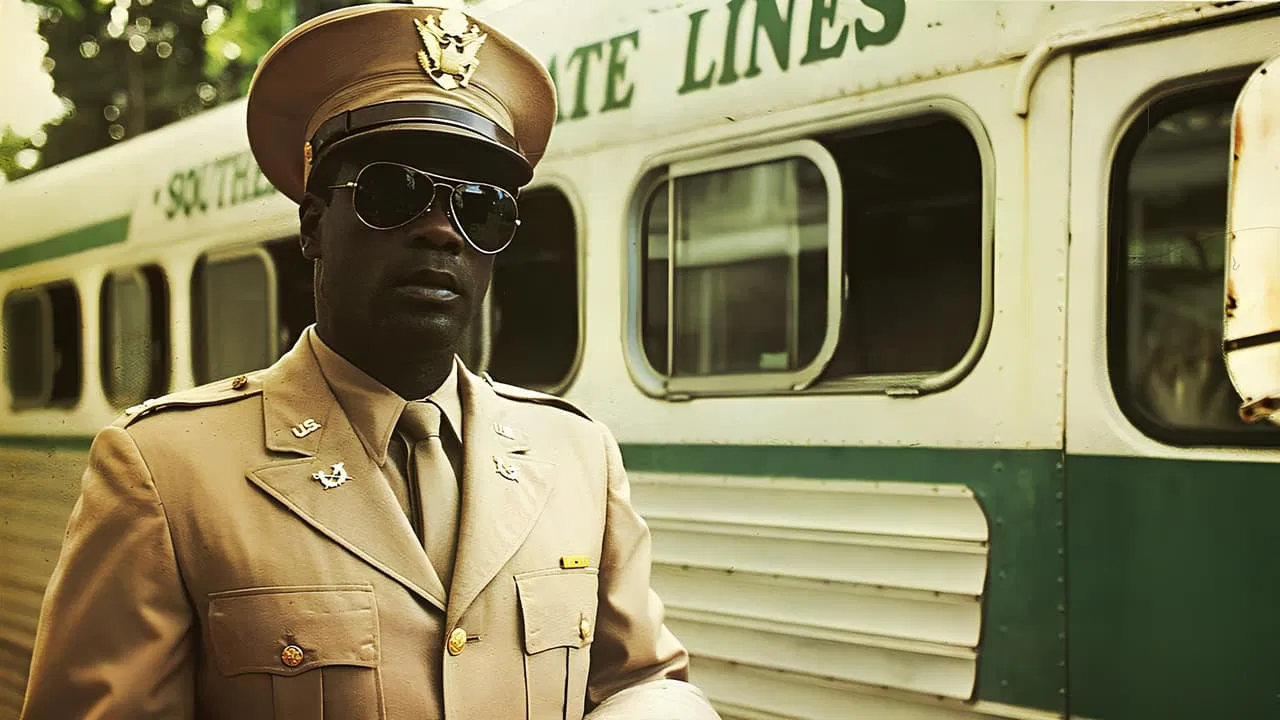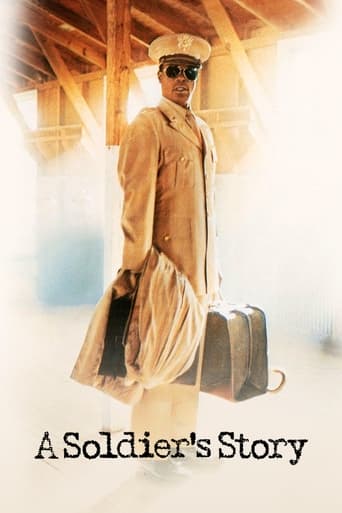

The Worst Film Ever
... View MoreAm I Missing Something?
... View MoreA film of deceptively outspoken contemporary relevance, this is cinema at its most alert, alarming and alive.
... View MoreThis is ultimately a movie about the very bad things that can happen when we don't address our unease, when we just try to brush it off, whether that's to fit in or to preserve our self-image.
... View MoreI suppose the big thing for this movie is that most of the actors are black and it seeks to portray conditions in the military during the time of WWII.I, on the other hand, was just looking to watch a good murder mystery.What I got was the equivalent of "In The Heat Of The Night" if it was put on by your local amateur dramatics society.The murder story is nothing startling or new. Somebody is killed, various people are suspected and eventually the guilty person is found. You can do your own guessing, but it doesn't take an Einstein.What put me off is that the acting is not very good. Other than the Sargent I didn't feel that any of the characters offered anything beyond the clichéd characters role they were handed.
... View MoreThis movie tries to do two separate and distinct things; one it does very well, the other is a so-so effort. As regards the latter, frankly, this isn't the most compelling murder mystery you're ever going to come across. On a US Army base made up of mostly black troops in Louisiana in 1944, a black sergeant is murdered, and the question is who did it. Many think it was local Klansmen who didn't like seeing a black man in a position of responsibility, but that theory is quickly rejected and in steps Captain Davenport (played by Howard Rollins) - a black lawyer/officer charged with solving the mystery. Most of the movie is told in flashbacks as Davenport questions the various soldiers on the base to try to unravel the mystery. Rollins was good in the role, and the movie paints a complex (and sometimes confusing) picture of Sgt. Waters, giving reasons for both liking and disliking him, and opening up the possibility that virtually everyone he came into contact with might have had some motive for wanting to kill him. The mystery around the killer's identity is indeed a mystery right up to the very end. There was no reason given to suspect any one character over another. Still, I wasn't especially drawn in by the murder mystery, and if that was all that was going on here this would have been a real disappointment. My sense, though, is that the murder mystery was really background to a bigger issue.What's interesting here is the racial study. What's interesting is watching the pride black soldiers felt in seeing a black officer for the first time. What's interesting is seeing the discomfort of white officers around how to react to a black officer. What's interesting is seeing the interactions between the black soldiers themselves, all trying in their own way to find a way to fit in and to advance at the same time - some asserting their racial identity, some feeling that to get ahead they had to become more like whites, and not always getting along with each other as they approach the racial issues in different ways. This was, indeed, an interesting look at what life might have been like on such a base at the time, and it was that part of the story that was really most interesting to me. The murder mystery was worth watching only insofar as it helped to highlight those racial issues that were ever-present.Of note, I suppose, is that this is one of the earliest roles played by Denzel Washington, as a private on the base who's one of the suspects in the murder because of a confrontation he had with Rivers. It's an important although not a huge role. Rollins was really the star of the movie, and he was very good. Adolph Caesar as Sgt. Rivers was good - perhaps a bit of a caricature of an army sergeant in some ways, but still quite good.
... View MoreThis movie is a stone-cold, under-rated masterpiece which continues to stand up over the years. I've watched it many times and it's definitely in my top ten of all time for several reasons. First and foremost is the superb ensemble acting, inspired and united by the great Adolph Caesar. There is a wonderful sense of totally professional unity and purpose among all the cast that is extremely rare. I think it's Norman Jewison's best. Having seen it many times since 1984, I am continually impressed by all the interesting subtleties throughout. Such as the way the camera moves and tracks the action, the wonderful editing, lighting, sense of time and place, dramatic tension and pacing, great script-----this movie is a textbook of how to make a really great movie. Film students should study it and learn from it. It's got everything going it for it that stands up with any of the so-called greatest movies of all time. It should have won Best Picture when it came out, and Best Actor for Adolph Caesar. It says a lot about Hollywood that it didn't. It focuses on a dark chapter in American history that Hollywood rarely visits, and it's a tough and hard-hitting story about racism and anger that wasn't intended to be big at the box office---which to me makes it all the more valuable.
... View MoreIn something that could only come from Norman Jewison, a murder on a military base during WWII sets off a series of racial tensions. The Deep South setting creates the same sort of feeling that Jewison's "In the Heat of the Night" did, what with different kinds of tension. Nowadays, we may just want to watch it to see one of Denzel Washington's early roles (I believe that he wasn't very famous when "A Soldier's Story" came out). But I would say that it's a lot more than that, as you can feel everything about to explode. Very tense.So I recommend it. Also starring Howard E. Rollins Jr., Adolph Caesar, David Alan Grier and Patti LaBelle. As it is, this one and "The Color Purple" are Adolph Caesar's only two starring roles to my knowledge. And how many African-Americans are named Adolph?
... View More